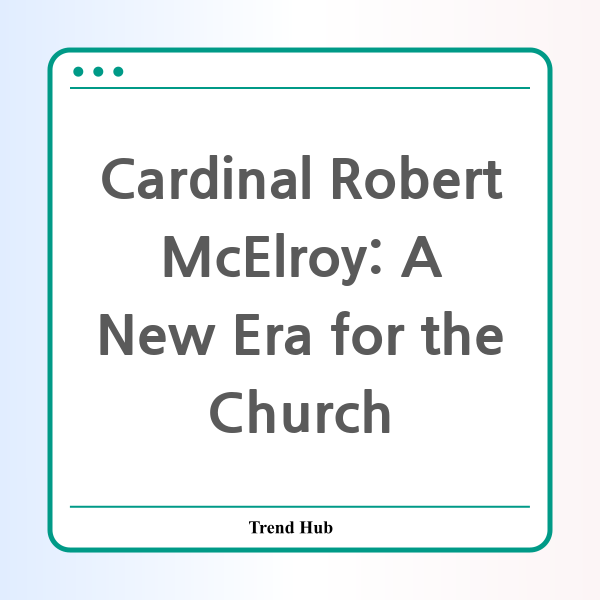* This website participates in the Amazon Affiliate Program and earns from qualifying purchases.

What does the appointment of Cardinal Robert McElroy as the new archbishop of Washington, D.C. mean for the Church and its role in American society? With a career steeped in advocacy for social justice, McElroy's ascension to this prominent position comes with much anticipation, especially amid a polarized political landscape. This transition signals a potentially transformative phase for the Catholic Church in America.
Cardinal Robert McElroy, a significant figure in the liberal wing of the Catholic Church in the United States, has been appointed by the Pope to succeed Cardinal Wilton Gregory. Notably, McElroy has garnered recognition as a vocal advocate for migrants, the environment, and the inclusion of LGBTQ+ individuals within the Church. At 70 years old, his experience as the bishop of the San Diego diocese—situated along the U.S.-Mexico border—positions him uniquely to address pressing issues surrounding immigration and social justice.
This appointment stands out not just for its implications for the Catholic faith community but also for its broader political significance. Early in Donald Trump’s presidency, McElroy publicly challenged the administration’s hardline stance on immigration, urging Catholics to actively oppose anti-immigrant narratives. His call for the Church to become a force for good resonates with Pope Francis' vision for a more inclusive and compassionate Church.
At his introductory address as the new archbishop, McElroy emphasized themes of unity and gratitude. Acknowledging the diversity within the Catholic community, he made a conscious effort to reach out to different demographics, including African Americans and the Hispanic community. He articulated a commitment to understanding and acknowledging the experiences of all individuals, especially marginalized groups, stating, "We must always have a sense of the dignity of every human person." This message of radical inclusion is especially relevant in today's context, where divisions over immigration and other critical social issues persist.
Importantly, McElroy's tenure comes at a time when the Church is still grappling with the fallout from past sexual abuse scandals. Cardinal Gregory was appointed to restore trust within the Archdiocese, which was tarnished by scandal. With McElroy at the helm, there is hope for a renewed focus on transparency and accountability while simultaneously addressing contemporary social justice concerns.
As he steps into this role, McElroy’s relationship with the incoming Trump administration will be closely scrutinized. His past criticisms of Trump's immigration policies indicate a potential clash, as the administration may pursue agendas that contradict Catholic teachings on human dignity. McElroy has underscored the Church's belief that while nations have the right to control their borders, they must also uphold the dignity of all individuals, including immigrants and refugees. His ability to navigate this political tightrope will be crucial in his new role.
Moreover, McElroy's appointment aligns with a broader trend within the Church under Pope Francis, which seeks to decentralize Church governance and increase the representation of women and marginalized voices. This shift is underscored by the recent appointment of Sister Simona Brambilla as the first female head of a Vatican department. McElroy's engagement in promoting dialogue and fostering understanding among diverse communities reflects this ongoing transformation.
Critics from within the Church's traditionalist factions may view McElroy's liberal stance as overly political; yet, many supporters argue that his approach embodies a much-needed voice of reason and compassion. As the archbishop of Washington, D.C., McElroy has the unique opportunity to influence national dialogues on critical issues such as immigration, social justice, and economic inequality. His stature as a leading theologian and advocate for the marginalized positions him as a significant player in shaping the Church’s voice in contemporary society.
Looking ahead, it is clear that the appointment of Cardinal Robert McElroy marks the beginning of a new chapter for the Catholic Church in America. His commitment to pastoral care and social justice heralds an era where the Church may take a more active role in advocating for the vulnerable and marginalized within society. As McElroy steps into his new role, the faithful and observers alike will be watching closely, hopeful that his leadership will usher in a renewed sense of hope and healing within the community and beyond.
* This website participates in the Amazon Affiliate Program and earns from qualifying purchases.